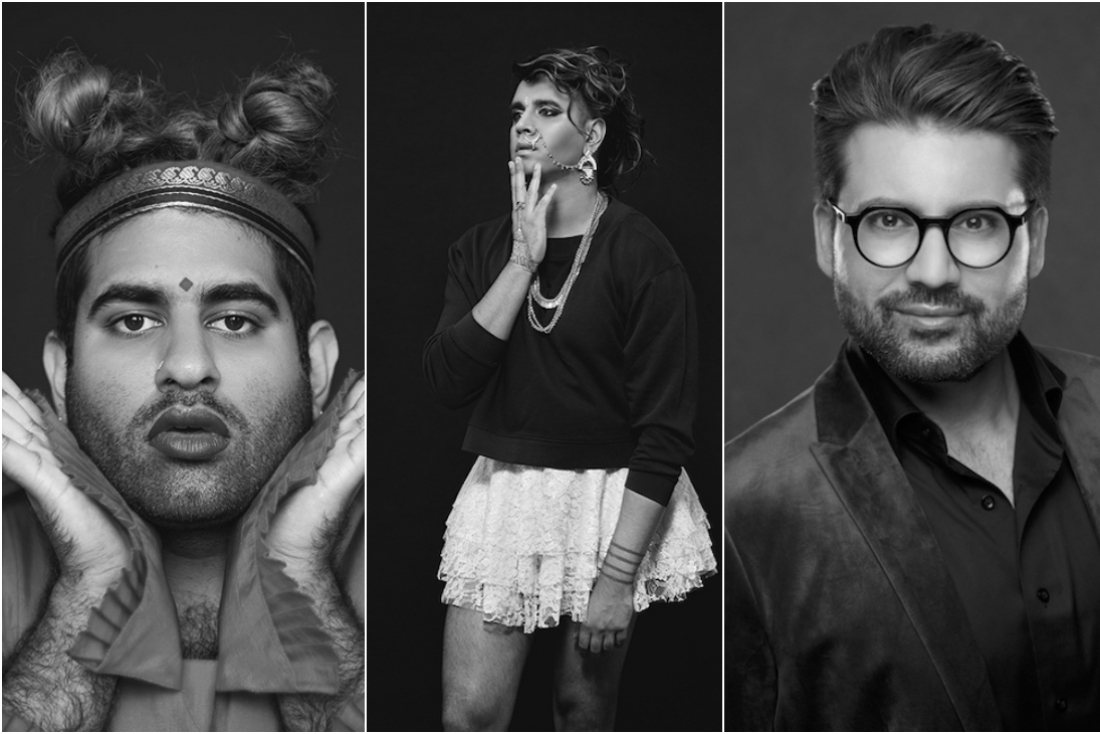
L-R: Alok V. Menon (Photograph by Elif Kücük), Vivek Shraya, Nemat Sadat

L-R: Alok V. Menon (Photograph by Elif Kücük), Vivek Shraya, Nemat Sadat
The world of the written word has always been inclusive. Even though the literary output might be shunned or the writer's identity hidden, literature has still managed to give space to voices that are marginalised or ignored. Writing has quite frequently become a way of not just escaping the immediate reality for many, but also of expressing themselves, and a tool for recognising who they truly are. As more and more LGBTQIA artists have risen to fame, so have the community's authors, who've used the power of writing to emanicapate themselves and their identities. Platform has also had the privilege to speak to such authors and learn more about them. In celebration of Pride Month, we revisit our conversation with LGBTQIA authors and provide snippets from their journeys of courage.
Alok Vaid Menon: Growing up as part of the Indian diaspora I was always made to feel that my sexuality and my gender were something that I picked up 'in America', and was routinely told that there were no LGBTQIA people in India. Connecting with such artists and activists in India and sharing my work there touches me deeply. My experiences in India have been some of the most foundational to my life and my creative practice.
The process of saying, 'This is who I am' is one of the most intense and complicated journeys. I think all of us are struggling with it in our own ways. I don’t think gender non-conforming and non-binary people have a necessarily more complex journey, I think we are more honest about how difficult it is. Things like 'language' and 'identity' are devices we use to approximate what we feel in the inside so there is always a disconnect between who we know we are and how we are able to express it.
I believe that there are as many genders as there are people in the universe. I think the goal is less about 'accepting trans people,' and more about accepting the ways in which all of us [regardless of how we identify] fail to embody a reductive binary of 'man' or 'woman'. Trans identity is complex because humanity is complex – we have to commit ourselves to constantly learning and recognizing that difference and diversity are strengths, not weaknesses.
Vivek Shraya: The decision to explore 'she' and 'her' as pronouns happened in August 2015. Performing masculinity as a way to prove my manhood, which included weightlifting or sporting a beard or walking widely, was exhausting. After turning 30, I found myself caring less about the consequences of straying from my assigned gender.
I am drawn to certain themes; gender, Hinduism, my mother, and self-love. I have always looked up to my mother, especially her femininity. She was also one of the only people in my childhood and teenage years who didn’t chastise me for my femininity. Consequently, she has been a re-occurring theme in my work. While transitioning, it’s been uncanny to look at her older photos and see our resemblance.
Nemat Sadat: After I became the first person in the Afghan community to come out to the entire world by posting a message on Facebook in August 2013, a lot of relatives and friends blocked me out of their lives, claiming that I brought them and the entire community of Afghans and Muslims dishonor by revealing my sexuality. I didn’t give up though. I knew in my heart I was doing right. My coming out and relentles campaign for LGBTQIA rights has awakened a gay movement in Afghanistan.
I was admitted to an advanced novel writing class at Harvard Summer School despite having taken no prior fiction writing course prior to that. However, I was scarred in that writing workshop since the instructor and all the other students were heterosexual, white, native-born, and hailed from Judeo-Christian heritage and I was the sole brown, gay Afghan refugee from Muslim lineage. The demeaning comments the instructor made about my work in front of the class scarred me so much it slammed the brakes on my writing. My breakthrough in writing didn’t come until 2012 when I returned to Afghanistan, after having lived 31 years in exile, and developed a heightened sense of awareness for what Old World Kabul was like. That same year I also gained admission into the master’s degree program in creative writing at the University of Oxford. This was around the time I started to relive the epiphany that prompted my intense storytelling burst.